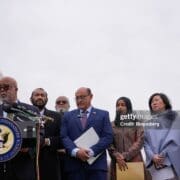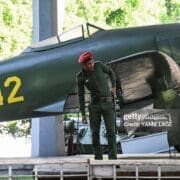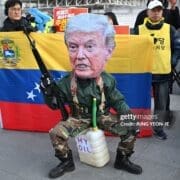News Americas, NY, NY: The United States has killed more than 115 people in boats across the Caribbean Sea and Pacific Ocean by blowing up vessels it identified as carrying drug traffickers. This comes as the United States’ 2025 Narco Report – International Narcotics Control Strategy Report, (INCSR), identified the Caribbean as a central transshipment corridor for drug trafficking in the movement of cocaine from Venezuela to North America – underscoring the region’s growing strategic importance in global narcotics trafficking networks.
A US Air Force F22-Raptor takes off from José Aponte de la Torre Airport, formerly Roosevelt Roads Naval Station, in Ceiba, Puerto Rico, on January 4, 2026. US President Donald Trump threatened Sunday that Venezuela’s new leader will pay a “big price” if she does not cooperate with the United States, after US forces seized and jailed her former boss Nicolas Maduro. If interim president Delcy Rodriguez “doesn’t do what’s right, she is going to pay a very big price, probably bigger than Maduro,” Trump told The Atlantic in a telephone interview. (Photo by Miguel J. Rodriguez Carrillo / AFP via Getty Images)
According to the report, cocaine shipments originating in Colombia and Venezuela are routinely moved through Caribbean airspace and territorial waters using go-fast boats, fishing vessels, container ships, and clandestine aircraft before reaching the United States or onward markets in Europe. The Bahamas, Belize, the Dominican Republic, Haiti, Jamaica were all named as major illicit drug producing and/or drug-transit countries in the Caribbean.
The INCSR warned that trafficking through the Caribbean is sustained not only by geography, but by systemic corruption and weak institutional controls in key transit zones. Traffickers, the report states, often rely on local political protection, compromised security services, and limited enforcement capacity to move drugs with minimal interference.
Of particular relevance amid heightened regional political scrutiny, the report notes that corruption linked to narcotics trafficking frequently extends into political structures along major trafficking routes. While the report does not name Caribbean officials, it explicitly states that cocaine traffickers pay politicians and officials for protection from arrest and operational freedom – allowing drugs to transit the region with impunity.
The Caribbean’s role is described as logistical rather than production-based, but no less critical. Traffickers use the region for storage, repackaging, refueling, and redistribution, increasing cocaine’s value at each stage before it reaches U.S. markets, where demand and prices are highest.
“The Dominican Republic (DR) serves as a transit point for South American cocaine moving through the Caribbean to the United States and Europe,” the report said. “Traffickers rely on direct maritime routes from the Venezuelan and Colombian coasts, using “go-fast” boats to reach remote areas off the DR’s southern coast.”
Additionally, the US report said “D”drug trafficking in the six island nations of the Dutch Caribbean varies in scope.”
“However, the overall area remains significant due to its location as an international drug transshipment point,” the report added.
“Sint Maarten is in the Eastern Caribbean and is a transshipment hub for cocaine and marijuana transiting onward to Puerto Rico, the U.S. Virgin Islands, and Europe,” the 2025 report stated. “Cocaine and marijuana are primarily transported via different maritime vessels for transshipment to the U.S., other Caribbean islands, Africa, and Europe. In addition, traffickers routinely stage smaller airplanes on the islands for drug runs to Venezuela and Colombia.”
The US said that drugs, “after traveling to cocaine production countries, the aircraft normally fly onward to Central America, Guyana, Suriname, or other Caribbean destinations including the U.S. Virgin Islands and The Bahamas.”
“In addition, all major islands reported maritime vessels of varying sizes involved in the smuggling of narcotics originating from Venezuela with ultimate destination to the United States or Europe,” the report’s authors said. “This open cooperation ultimately allows the United States to deploy enforcement resources more effectively throughout the region to prevent the flow of drugs into the United States.”
On Haiti, the report said “Haiti remains a transit point for cocaine from South American and marijuana from Jamaica en route to the United States,” but noted that “lLocal drug production is minimal, primarily consisting of cannabis cultivation for domestic consumption.”
Focusing on Jamaica, the report said “Jamaica is both a significant producer of illicit drugs and a key transit country for narcotics destined for North America and Europe.”
“Jamaica is the Caribbean’s largest producer of cannabis, which is cultivated in its expansive rural areas,” the report said. “The country is strategically located for cocaine transshipment between South America, especially Colombia, and the United States. Jamaican criminal networks are often linked to transnational organized crime and facilitate drug trafficking via air and maritime routes. Marijuana is widely consumed in Jamaica and the use of psychoactive drugs, such as MDMA, is increasing. Psilocybin is largely unregulated, and a growing commercial industry promotes its use.”
The report also highlighted growing security risks associated with trafficking, including the spillover of organized crime, firearms, money laundering, and gang activity into Caribbean societies. These pressures strain already limited law-enforcement resources and threaten economic stability – particularly in tourism-dependent states.
In addition, the INCSR pointed to increasing use of maritime routes across the southern and eastern Caribbean, including areas bordering Venezuela, Guyana, and Suriname. These routes are often harder to monitor and exploit gaps in radar coverage, aerial surveillance, and coast-guard capacity.
While some Caribbean governments cooperate closely with U.S. and regional partners, the report emphasized that uneven enforcement and political sensitivity continue to undermine collective responses. Traffickers, it notes, adapt quickly, rerouting shipments through jurisdictions perceived as less vigilant.
The findings arrive at a moment of intensified regional attention following U.S. indictments tied to Venezuela’s leadership. Those charges have fueled public debate and speculation across the Caribbean and the Diaspora about political exposure along trafficking routes referenced- but not named – in U.S. court filings.
The indictment alleges that politicians operating along what prosecutors describe as a “Caribbean route” were corrupted by cocaine traffickers, accepting payments in exchange for protection from arrest and allowing favored traffickers to operate with impunity as cocaine moved north from Venezuela toward the United States.
While no Caribbean officials are named in the documents, the reference has sparked widespread discussion on social media and in political circles across the region.
Ultimately, the INCSR calls for stronger regional coordination, intelligence-sharing, and institutional reform, warning that without sustained action, the Caribbean risks becoming further entrenched as a strategic bridge in the global cocaine trade.
As U.S. enforcement and scrutiny intensify, the report makes clear that the Caribbean’s role – whether through vulnerability, governance gaps, or corruption – remains central to the hemisphere’s narcotics challenge.










